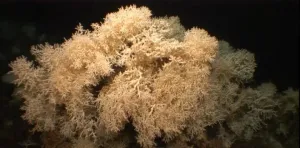Scientists discover how the potentially oldest coral reefs in the Mediterranean developed
2021-01-21
(Press-News.org) A new study from the Institut de Ciències del Mar (ICM-CSIC, Spain) and the National Oceanography Centre brings unprecedented insights into the environmental constraints and climatic events that controlled the formation of these reefs.
The results of this research will help understand how cold-water coral reefs can react to the effects caused by the present-day climate change.
Similar to tropical coral reefs, cold-water coral reefs are incredible hotspots of biodiversity, with the difference that they do not rely on symbiosis with microscopic algae, and therefore can be found in the dark and deep waters of our oceans. Despite their uniqueness and key functional role in the ocean, they are still partially unknown ecosystems, which still lack of thorough procedures to protect them from human-derived disturbances. In fact, they are considered vulnerable marine ecosystems by the United Nations, the OSPAR Commission and the General Fisheries Commission for the Mediterranean.
Now, an international team of scientists from the Institut de Ciències del Mar (ICM-CSIC) and the NOC has studied for the first time the main drivers that control the development of cold-water reefs in the Western Mediterranean during the last 400,000 years. In these reefs, the deeper you go, the older the corals will be, since new generations grow on top of the previous ones. The results of this research are collected in a paper published recently in the journal Quaternary Science Reviews and bring unprecedented insights into the environmental constraints and climatic events that controlled the cyclic development of these reefs.
To carry out the study, researchers made use of Laser Ablation U-series dating, a new technique consisting of ablating and ionising samples with an inductively coupled plasma mass spectrometer to determine the age of 110 cold-water coral skeletons. Combined with other analyses, these allowed them to describe when the main periods of reef formation occurred and which were the main environmental drivers of coral reef formation in this region.
According to this work, cold-water corals have been growing almost continuously in the Mediterranean for the last 400,000 years, even before the appearance of the first Neanderthals. Nonetheless, they might have started to form much earlier, as only the shallower part -10 m- of the entire reef height -80-90 m- could be described in this study.
The analyses of the semi-fossil corals acquired showed that coral growth and reef formation was affected by major changes in climate over this time period. "Climate swings associated with ice ages, such as changes in sea surface productivity and sea-level variations appear to be the main factors controlling the development of these cold-water coral reefs", explains Guillem Corbera, PhD student from NOC and the University of Southampton.
"In addition, intense and prolonged monsoon events that mainly affected the Eastern Mediterranean Sea had a detrimental impact for the development of these reefs, located 1000s of kilometers away in the Westernmost Mediterranean", adds Corbera.
"Throughout the last 400,000 years, depending on the climate conditions, different species of corals dominated these reefs, which created impressive geo-forms in the deep ocean. This research helps us understand how cold-water coral reefs can react to the effects caused by the present-day climate change", states the ICM-CSIC researcher Claudio Lo Iacono, who discovered these reefs some years ago and has now led this study.
In the Mediterranean Sea the development of cold-water coral reefs has been studied before, and scientists have so far determined the age of coral samples from different locations. They have also attempted to link coral reef formation patterns to different environmental factors, but unlike this article, they have not been able to investigate cold-water coral reef development beyond the last ~15,000 years.
INFORMATION:
This work was funded by the Graduate School of the National Oceanography Centre (GSNOCS), with the collaboration of ICM-CSIC, the NGO Oceana and by the EuroFLEETS GATEWAY project. Finally, the research involved collaboration with the German research Institutes MARUM and GEOMAR, the University of Barcelona and Ghent University.
[Attachments] See images for this press release:

ELSE PRESS RELEASES FROM THIS DATE:
2021-01-21
Breast cancer investigators in the Lambe Institute at NUI Galway have collaborated on a pivotal international study into breast cancer risk which was published in the New England Journal of Medicine today (Wednesday, 20 January). The results of the study have identified that there are nine specific genes associated with breast cancer risk.
Contributing authors Professor Michael Kerin, Chair of Surgery at NUI Galway, Director of the Cancer Managed Clinical Academic Network for Saolta University Health Care Group, along with Dr Nicola Miller, Lecturer in NUI Galway's School of Medicine, have directed the Breast Cancer in Galway Genetics Study (BIGGS) since 2008. DNA samples, which have been collected from 2,000 Irish ...
2021-01-21
Genetic inheritance affects the likelihood of developing breast cancer. Some genes are already known to increase cancer risk; other genes are suspected to be involved, but not to what extent. It is crucial to clarify this issue to improve prevention since it opens the way to more personalised follow-up and screening programs. A large international consortium, which includes the Spanish National Cancer Research Centre (CNIO), has studied 34 putative susceptibility genes on samples from 113,000 female breast cancer cases and controls, and its results confirm the importance ...
2021-01-21
When university campuses sent students, staff and faculty members home in March, Padmini Rangamani, a professor at the University of California San Diego, suddenly found herself running her research lab remotely, teaching her classes online, and supervising her two children, ages 10 and 13, who are also learning online.
To deal with the stress the situation created, Rangamani turned to a support network of fellow female faculty members around the United States. They chatted and texted and eventually decided to write a scholarly article with recommendations for all other female principal investigators in academia.
The article, "Ten simple rules for women principal investigators during a pandemic," ...
2021-01-21
Generating membranes using electrochemical polymerization, or electropolymerization, could provide a simple and cost-effective route to help various industries meet increasingly strict environmental regulations and reduce energy consumption.
Researchers from KAUST have produced membranes with well-defined microscopic pores by electrochemically depositing organic conjugated polymers onto highly porous electrodes. These microporous membranes have numerous applications, ranging from organic solvent nanofiltration to selective molecular transport technologies.
High-performance separation depends on membranes that are robust with well-ordered and dense microporous structures, such as zeolites and ...
2021-01-21
Scientists from an international collaboration have found evidence of alpha particles at the surface of neutron-rich heavy nuclei, providing new insights into the structure of neutron stars, as well as the process of alpha decay.
Neutron stars are amongst the most mysterious objects in our universe. They contain extremely dense matter that is radically different from the ordinary matter surrounding us--being composed almost entirely of neutrons rather than atoms. However, in the nucleus at the center of normal atoms, matter exists at similar densities.
"Understanding the nature of matter at such extremes is important for our understanding of neutron stars, as well as the beginning, ...
2021-01-21
COVID-19 has been spreading rapidly over the past several months, and the U.S. death toll has now reached 400,000. As evident from the age distribution of those fatalities, COVID-19 is dangerous not only for the elderly but for middle-aged adults, according to a Dartmouth-led study published in the European Journal of Epidemiology.
"For a person who is middle-aged, the risk of dying from COVID-19 is about 100 times greater than dying from an automobile accident," explains lead author Andrew Levin, a professor of economics at Dartmouth College. "Generally speaking, very few children and young adults die of COVID-19. However, the risk is progressively greater for middle-aged and older adults. The odds that ...
2021-01-21
The bipolar membrane, a type of ion exchange membrane, is considered the pivotal material for zero emission technology. It is composed of an anode and cathode membrane layer, and an intermediate hydrolysis layer. Under reverse bias, the water molecules in the intermediate layer produce OH- and H+ by polarization.
Large-scale production of the membrane is hindered by the different expansion coefficients of the anode and cathode layers, causing the two layers easy to delaminate. Besides, the mostly used intermediate catalysts are small molecules or transition, which are instable and inefficient.
In a study published on Nature Communications, a team led by ...
2021-01-21
BOSTON - Regular aspirin use has clear benefits in reducing colorectal cancer incidence among middle-aged adults, but also comes with some risk, such as gastrointestinal bleeding. And when should adults start taking regular aspirin and for how long?
There is substantial evidence that a daily aspirin can reduce risk of colorectal cancer in adults up to age 70. But until now there was little evidence about whether older adults should start taking aspirin.
A team of scientists set out to study this question. They were led by Andrew T. Chan MD, MPH, a gastroenterologist and chief of the Clinical and Translational Epidemiology Unit at Massachusetts General Hospital (MGH). Their report appears in JAMA Oncology.
The researchers ...
2021-01-21
Tsukuba, Japan -- How valuable are earmuffs? The answer to this simple question can depend. What brand are they? Are they good quality? What is the weather like? Given the choice between earmuffs and suntan lotion, most people would choose to have the earmuffs on a cold winter day and the lotion on a sunny day at the beach. This ability to place different values on objects depending on the environmental context is something that we do all the time without much thought or effort. But how does it work? A new study led by Assistant Professor Jun Kunimatsu at the University of Tsukuba in Japan and Distinguished Investigator Okihide Hikosaka at the National Eye Institute (NEI) in the United States has discovered the part of ...
2021-01-21
The elusive axion particle is many times lighter than an electron, with properties that barely make an impression on ordinary matter. As such, the ghost-like particle is a leading contender as a component of dark matter -- a hypothetical, invisible type of matter that is thought to make up 85 percent of the mass in the universe.
Axions have so far evaded detection. Physicists predict that if they do exist, they must be produced within extreme environments, such as the cores of stars at the precipice of a supernova. When these stars spew axions out into the universe, the ...
LAST 30 PRESS RELEASES:
[Press-News.org] Scientists discover how the potentially oldest coral reefs in the Mediterranean developed




